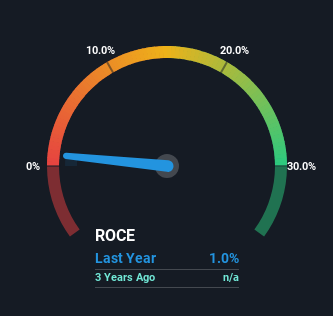- Canada
- /
- Oil and Gas
- /
- TSX:LCFS
Tidewater Renewables (TSE:LCFS) Has Some Difficulty Using Its Capital Effectively
What financial metrics can indicate to us that a company is maturing or even in decline? A business that's potentially in decline often shows two trends, a return on capital employed (ROCE) that's declining, and a base of capital employed that's also declining. This reveals that the company isn't compounding shareholder wealth because returns are falling and its net asset base is shrinking. And from a first read, things don't look too good at Tidewater Renewables (TSE:LCFS), so let's see why.
What Is Return On Capital Employed (ROCE)?
If you haven't worked with ROCE before, it measures the 'return' (pre-tax profit) a company generates from capital employed in its business. Analysts use this formula to calculate it for Tidewater Renewables:
Return on Capital Employed = Earnings Before Interest and Tax (EBIT) ÷ (Total Assets - Current Liabilities)
0.0096 = CA$7.7m ÷ (CA$1.1b - CA$270m) (Based on the trailing twelve months to June 2024).
So, Tidewater Renewables has an ROCE of 1.0%. In absolute terms, that's a low return and it also under-performs the Oil and Gas industry average of 9.5%.
See our latest analysis for Tidewater Renewables

Above you can see how the current ROCE for Tidewater Renewables compares to its prior returns on capital, but there's only so much you can tell from the past. If you're interested, you can view the analysts predictions in our free analyst report for Tidewater Renewables .
What The Trend Of ROCE Can Tell Us
We are a bit worried about the trend of returns on capital at Tidewater Renewables. About two years ago, returns on capital were 2.5%, however they're now substantially lower than that as we saw above. Meanwhile, capital employed in the business has stayed roughly the flat over the period. Since returns are falling and the business has the same amount of assets employed, this can suggest it's a mature business that hasn't had much growth in the last two years. So because these trends aren't typically conducive to creating a multi-bagger, we wouldn't hold our breath on Tidewater Renewables becoming one if things continue as they have.
On a side note, Tidewater Renewables' current liabilities have increased over the last two years to 25% of total assets, effectively distorting the ROCE to some degree. If current liabilities hadn't increased as much as they did, the ROCE could actually be even lower. While the ratio isn't currently too high, it's worth keeping an eye on this because if it gets particularly high, the business could then face some new elements of risk.
The Key Takeaway
All in all, the lower returns from the same amount of capital employed aren't exactly signs of a compounding machine. Unsurprisingly then, the stock has dived 88% over the last three years, so investors are recognizing these changes and don't like the company's prospects. That being the case, unless the underlying trends revert to a more positive trajectory, we'd consider looking elsewhere.
If you want to know some of the risks facing Tidewater Renewables we've found 3 warning signs (1 is a bit concerning!) that you should be aware of before investing here.
While Tidewater Renewables may not currently earn the highest returns, we've compiled a list of companies that currently earn more than 25% return on equity. Check out this free list here.
Valuation is complex, but we're here to simplify it.
Discover if Tidewater Renewables might be undervalued or overvalued with our detailed analysis, featuring fair value estimates, potential risks, dividends, insider trades, and its financial condition.
Access Free AnalysisHave feedback on this article? Concerned about the content? Get in touch with us directly. Alternatively, email editorial-team (at) simplywallst.com.
This article by Simply Wall St is general in nature. We provide commentary based on historical data and analyst forecasts only using an unbiased methodology and our articles are not intended to be financial advice. It does not constitute a recommendation to buy or sell any stock, and does not take account of your objectives, or your financial situation. We aim to bring you long-term focused analysis driven by fundamental data. Note that our analysis may not factor in the latest price-sensitive company announcements or qualitative material. Simply Wall St has no position in any stocks mentioned.
About TSX:LCFS
Tidewater Renewables
Engages in production of renewable fuel in North America.
High growth potential and good value.
Market Insights
Weekly Picks

Solutions by stc: 34% Upside in Saudi's Digital Transformation Leader


The AI Infrastructure Giant Grows Into Its Valuation
Recently Updated Narratives


The "Sleeping Giant" Wakes Up – Efficiency & Monetization


The "Rate Cut" Supercycle Winner – Profitable & Accelerating


The Industrialist of the Skies – Scaling with "Automotive DNA
Popular Narratives


MicroVision will explode future revenue by 380.37% with a vision towards success


NVDA: Expanding AI Demand Will Drive Major Data Center Investments Through 2026



